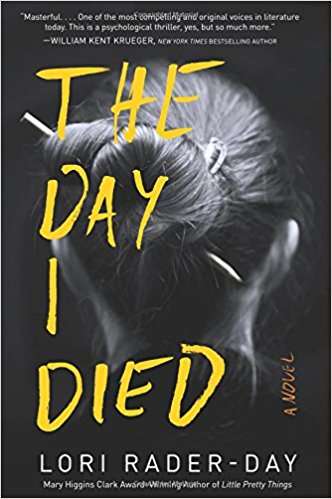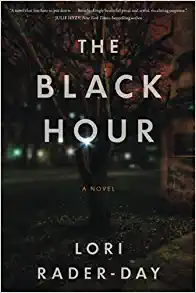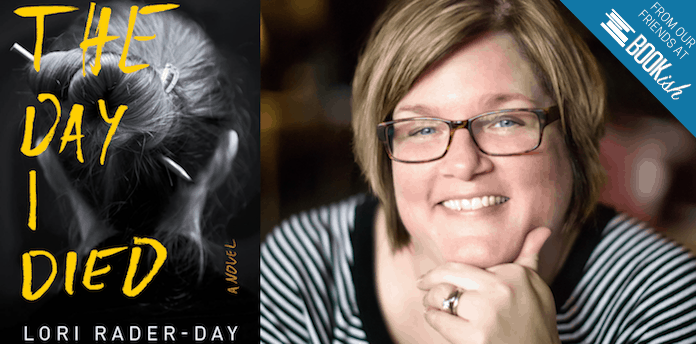The Black Hour by Lori Rader-Day
BookTrib is partnering with Bookish to bring you more great content, including this article written by Lori Rader-Day. Here, The Black Hour author talks all about writing what she doesn’t know. She also discusses how experts inform her writing and the “right” kind of research.
“Write what you know” is common advice for writers, but what about times when you want to learn and write about something new? Lori Rader-Day, author of The Day I Died has done her fair share of writing outside of her own lived experiences, and here, she shares some advice with Bookish readers about her research process. Whether you’re researching your own project, or just fascinated to know how books come together, we think you’ll find her advice illuminating.
 For my new novel, The Day I Died, I wrote about a handwriting expert who gets embroiled in a small town murder/kidnapping case that’s bound to unravel her life, which has been lived in basic obscurity on the run with her son for thirteen years.
For my new novel, The Day I Died, I wrote about a handwriting expert who gets embroiled in a small town murder/kidnapping case that’s bound to unravel her life, which has been lived in basic obscurity on the run with her son for thirteen years.
What people want to know about all that: Do I know how to analyze handwriting?
I’m reminded of the writerly adage where readers will skewer you for any tidbit of your nonfiction that smacks of lying but pick apart any fiction for a hint of real life—finding accusation with anything made up but then refusing to believe that anything made up can be entirely fictive. There’s a line there, and readers want to find it.
Me? I’m a make-it-up fiction writer who, yes, sneaks bits of my real life—and yours, if you sit still too long—into my work.
I’m no handwriting expert. I have also not raised a kid or lived on the run for thirteen years. For the handwriting expertise used in my novel, I did what all writers do at least a bit: I researched it.
Though there are a couple of ways I could have gone with the research for this novel, here’s what I did: I read a book. Specifically Sex, Lies, and Handwriting by Michelle Dresbold with Jack Kwalwasser. This book didn’t just provide the basis for any expertise I gave my character; it launched the entire premise of the novel. Back in 2007, I saw the book on a library shelf and thought: Hmm. There’s something I know nothing about.
And then I wrote the book anyway. That is the beauty of research. I don’t have to write what I know. I can write what I absolutely don’t know.
For instance, in my first novel, The Black Hour, I wrote about a university campus, something I knew a lot about, since I worked on one every day. But I wrote about it from the perspective of a sociology professor, while I was an administrator with absolutely no pedigree in the subject. What does a Sociology 101 professor say on that first day back in front of students, still recovering from an attack by a student she didn’t know and a little gun-shy? I didn’t know. I bought a textbook, and I studied up.
In my second novel, Little Pretty Things, I wrote about a motel housekeeper, once a promising high school long-distance runner and now stuck in life and hoarding secrets. I borrowed the town I’d grown up in—and a couple of hotels I’d had the pleasure of never sleeping in—but what I didn’t know was what it was like to be a high school track star. Runner’s high? Never heard of it. To get part that right, I had a friend of mine, a former high school long-distance runner, read the book and give me feedback.
I could have taken up running, sure. I could have done a PhD in sociology, too. How many lives do we get to live, though? I don’t have time to get a PhD in everything I want to write about and, if you want to read the books, neither do you. Plus, I’m rather impatient. I don’t read instruction manuals. Give me the headlines.
For The Day I Died, I spent only a little time on handwriting analysis, getting a general feel for how someone on that profession would notice and judge samples that appeared to her professionally and in daily life. What I cared more about was the protagonist’s relationship to her son, the protagonist’s relationship to her past, the protagonist’s ability to save herself and to let others save her. The research I did after the manuscript was complete had more to do with how a small town Indiana sheriff’s office functions. For that, I found an another expert to give me feedback.
Even as I write this, I’m starting to see where getting an expert read is my fallback. Does it seem like cheating? The truth is that I often don’t know what questions to ask an expert before I start writing. What I’m looking for from an expert reading my draft isn’t just error but missed opportunity—things I wouldn’t even know to ask about.
So what kind of research is the “right” kind? Anything that works, anything that thrills you, that keeps you writing, that keeps readers turning the pages. Anything that gives you the detail and texture of a life you haven’t lived, so that we all can.
Buy this Book!
Amazon




